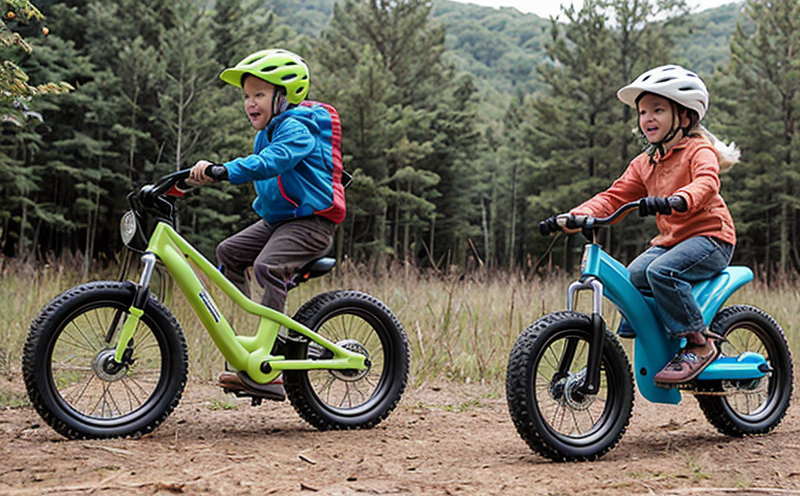ASTM F963 Toy Wagon and Cart Mechanical Safety Testing
The ASTM F963-17 standard is a comprehensive framework that ensures the mechanical safety of toys, including ride-on wagons and carts. This stringent set of guidelines aims to protect children from potential hazards by mandating rigorous testing procedures before any toy can be sold or distributed in the market.
The ASTM F963-17 standard focuses on various aspects of toy design that could pose a risk if not properly engineered. Ride-on wagons and carts are particularly challenging due to their dynamic nature, which makes them more prone to accidents. The testing protocols cover a wide range of mechanical components such as wheels, axles, handles, braking systems, and hinges.
One critical area addressed by ASTM F963 is the potential for sharp edges or protrusions that could cause injury during play. Additionally, the standard evaluates the durability of materials used in constructing these toys to ensure they can withstand typical usage without breaking down into hazardous pieces. Another important consideration is the stability of the wagon or cart under various conditions—whether loaded with a child or empty.
Testing procedures typically involve simulating real-world scenarios where children might interact with the toy, such as pulling it along surfaces or climbing on top of it. These tests help identify any weak points in construction that could lead to accidents if left unaddressed. By adhering strictly to ASTM F963 standards during manufacturing and quality assurance processes, companies can significantly reduce liability risks associated with product recall due to safety issues.
Compliance with ASTM F963 also provides a competitive advantage by demonstrating commitment to child safety—a key factor that influences parents' purchasing decisions. Furthermore, it ensures consistent quality across different batches of products manufactured at various facilities around the world. This uniformity helps maintain brand reputation and fosters trust among consumers.
The benefits extend beyond mere compliance; they contribute positively towards creating safer environments for children everywhere. As toy manufacturers strive to meet these high standards, innovations in design and manufacturing techniques are continually being introduced, leading to improved safety features incorporated into every new model released onto the market.
Applied Standards
The primary applied standard for this service is ASTM F963-17, which specifies requirements for mechanical performance tests on toys, including ride-on wagons and carts. Other relevant standards include ISO 8124 series, EN 71, and IEC 62100, all of which address various aspects of toy safety.
- ASTM F963-17: Mechanical Performance Test for Toys
- ISO 8124-1: Safety of Toys - Part 1: General Technical Requirements for the Safety of Toys
- EN 71-1: Toy safety - Part 1: Mechanical and physical properties
- IEC 62100: Safety of toys intended for children under three years old
These standards collectively provide a robust framework ensuring that all components of ride-on wagons and carts meet stringent safety criteria. They cover everything from the durability of materials used in construction to the design of handles, wheels, axles, and other critical parts.
Why Choose This Test
Choosing ASTM F963 mechanical safety testing for ride-on toy wagons and carts is essential for several reasons. Firstly, it ensures compliance with international regulations and industry best practices, thereby protecting your company against legal action and potential recalls. Secondly, meeting these standards enhances brand reputation by assuring consumers that their children’s safety has been prioritized.
Moreover, successful completion of ASTM F963 testing demonstrates a commitment to quality control throughout the manufacturing process. This transparency builds trust with customers who value reliability and consistency in product performance. Additionally, adherence to such stringent standards can open up new market opportunities domestically and internationally where compliance is mandatory or preferred by buyers.
For R&D engineers involved in designing innovative toys like ride-on wagons, following ASTM F963 guidelines provides a benchmark against which prototypes can be evaluated early in the development cycle. This allows for necessary adjustments to be made before full-scale production begins, saving time and resources while ensuring final products are safe.
Quality managers overseeing supply chain operations benefit greatly from knowing that suppliers delivering components for ASTM F963-compliant toys have already undergone rigorous quality assurance checks. This reduces the need for additional inspections downstream in the manufacturing process, streamlining overall efficiency.
Environmental and Sustainability Contributions
The ASTM F963 toy wagon and cart mechanical safety testing contributes significantly to environmental sustainability by promoting safer products that last longer without compromising on quality. Safer toys reduce the likelihood of recalls, which often result in waste generation during disposal processes.
- Reduction in Resource Consumption: By ensuring durability through rigorous mechanical safety tests, manufacturers can design toys using fewer resources and more sustainable materials.
- Extended Product Lifespan: Safer toys are less likely to break down prematurely, leading to extended usage periods which ultimately reduces the demand for new purchases.
- Easier Disposal: Safer toys that do not pose a risk of injury during playtime are easier and safer to dispose of at the end of their lifecycle. This facilitates recycling efforts, further reducing environmental impact.
The emphasis on durability within ASTM F963 encourages manufacturers to explore eco-friendly alternatives for materials without sacrificing performance standards. As toy design becomes more sustainable, it sets a precedent that can be adopted across other industries as well.





